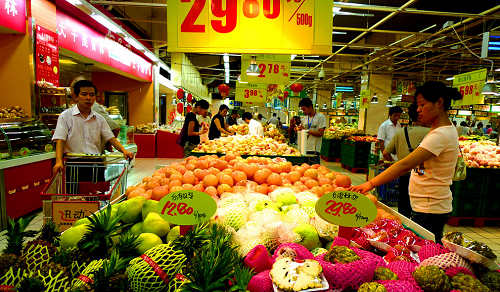Rising food prices cause March inflation rebound
 0 Comment(s)
0 Comment(s) Print
Print E-mail Shanghai Daily, April 10, 2012
E-mail Shanghai Daily, April 10, 2012
|
|
|
Customers pick up fruit at a supermarket in China. [File photo] |
The rate of inflation rebounded more than expected in March due to higher food costs, making it harder for the government to adopt any stimulus measures needed to forestall a hard landing in the world's second-largest economy.
The Consumer Price Index, the main gauge of inflation, rose 3.6 percent from a year earlier, the National Bureau of Statistics said yesterday. That compared with February's 3.2 percent inflation and exceeded forecasts for prices to rise 3.5 percent last month.
Food costs increased 7.5 percent, compared with a 6.2 percent rise in February.
"The inflation rebound is stronger than expected," said Li Maoyu, an analyst at Changjiang Securities Co. "Such a rate may invite policy-makers to be more cautious of any moves to stimulate the economy."
Li said recent signs that consumer goods were undergoing a new round of price increases were again triggering inflationary expectations.
Last month, China raised the retail prices for gasoline and diesel by more than expected and announced plans to introduce a graduated power tariff system. Companies have also announced price increases for daily necessities such as milk powder, cooking oil, fast food and shampoo, citing rising costs for labor and raw materials.
Liu Ligang, an economist at Australia and New Zealand Banking Group Ltd, said rising inflation may delay any prospect of an interest rate cut.
"Such an inflation rate is higher than the benchmark one-year deposit rate of 3.5 percent again, making it less likely for the central bank to lower interest rates any time soon," Liu said.
However, many analysts remain optimistic about government efforts to curtail inflation.
Lian Ping, chief economist at the Bank of Communications, said inflation was controllable and the country required more measures to boost growth.
"Despite a rebound, it was the second month for the inflation rate to fall below the government target of 4 percent," Lian said. "Considering that economic growth may ease further, the country should lower the reserve requirement ratio at least once to stimulate the economy."
China is to report first quarter gross domestic product figures on Friday, and economists estimate they will show growth at about 8.5 percent, down from 8.9 percent in 2011's final quarter.
Dropping producer prices are another sign that inflationary pressures may ease.
The Producer Price Index, the factory-gate measurement of inflation, lost 0.3 percent on an annual basis in March, the lowest since December 2009.
Zhu Haibin, an economist at JP Morgan, said the consumer price index rise in March will be temporary, and the index will fall again from April through the third quarter.
"Overall, the central bank should be able to achieve the full-year inflation target, even taking into account possible shocks arising from more expensive imported oil, higher labor costs and price reform of resource products," Zhu said.
He said the government would cut reserve rates two to three times this year to ensure steady economic growth.
To sustain economic growth and avoid a hard landing, China cut the reserve requirement ratio in February - the second time in three months - to pump in more funds into the banking system.
China lowered its economic growth target to 7.5 percent this year from the 8 percent in place since 2005, suggesting that there is a difficult road ahead for sustaining the country's growth.







Go to Forum >>0 Comment(s)